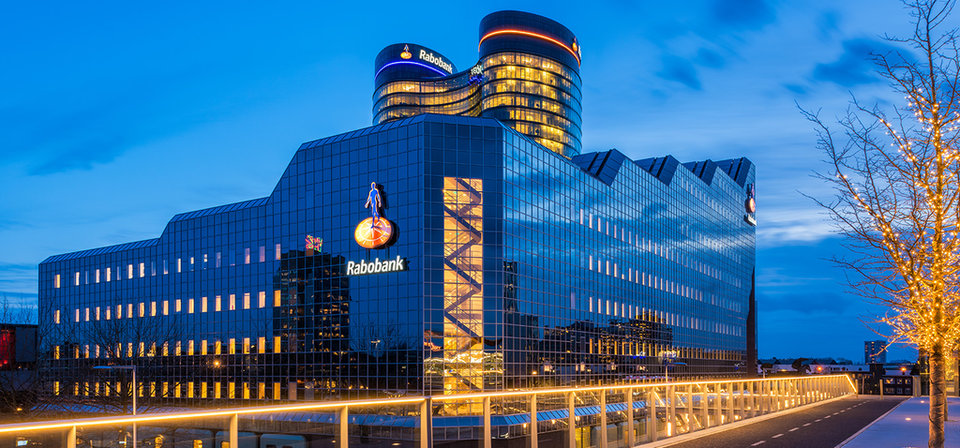COMPANY REPORT
DLL and Rabobank: A Dutch recovery from Covid-19
With the European Investment Bank (EIB) and DLL Ireland having agreed on an €80m green business investment initiative recently, we thought it convenient to review the last financial report by DLL’s parent.

R
abobank posted €632bn in total assets at the end of 2020, behind rivals ING (€937bn), but ahead of ABN Amro (€396bn), needless to say all three are leasing giants in their own right not just in their home country but across Europe and increasingly beyond too.
In its interim half-year results for 2021, Rabobank Group reported a bounce back with total assets of €651bn (H1 2020: €620bn).
In May 2019 DLL celebrated 50 years as an asset finance provider and today it boasts of a leasing portfolio in excess of €35bn, a footprint in more than 30 countries and specialisation in agriculture, food, healthcare, clean technology, construction, transportation, industrial, office equipment, and technology.
Since the outbreak of Covid-19 in Europe in March 2020, finance providers have taken a battering.
According to Rabobank's 2020 annual report, DLL’s net profit took a 49 per cent hit in 2020, which it said was “fully attributed to an increase in impairment charges on financial assets as a result of the negative effects of the Covid-19 pandemic and impairment on goodwill.” Against the backdrop of the pandemic, which included various government lockdowns, the lease portfolio grew by 2 per cent in 2020 against 2019.
In the first half of 2021, Rabobank Group reported an improvement in its performance.
“The €233m increase in DLL’s net profit can be primarily attributed to a significantly lower level of impairment charges on financial assets (a net release of €36m) as a result of more favourable economic conditions.
“The lease portfolio grew by almost 1 per cent (excluding currency movements) when compared to 2020,” Rabobank Group said in its half-year 2021 report.
Rabobank’s first half of 2021
Total income stable
The total income of the leasing segment was stable at €751m (2020: €751m) in the first half of 2021. Net interest income increased by 1 per cent to €558m (2020: €550m), mainly as a result of improved margins on new business volumes. Net fee and commission income was stable at €53m (2020: €53m). Other results, mainly consisting of income from operating leases and sales on end-of-lease assets, decreased to €140m (2020: €148m).
Operating expenses 3% lower
Total operating expenses in the leasing segment decreased by 3 per cent to €372m (2020: €385m). Staff costs decreased by 2 per cent to €269m (2020: €275m), in part due to lower travel costs, as international mobility continued to be impacted by Covid-19 restrictions. Staff numbers in the leasing segment decreased by 84 FTEs to 5,425 FTEs in the first half of 2021. Other administrative expenses were lower and amounted to €90m (2020: €97m). The total amount for depreciation and amortization was stable at €13m (2020: €13m).
Lower impairment charges on financial assets
In the first half of 2020, impairment charges were high (€272m) as a result of the deteriorating outlook created by the Covid-19 pandemic. DLL has supported customers affected by the pandemic and subsequent containment measures by granting temporary payment relief when needed. Due to much improved macroeconomic conditions in the first half of 2021, and credit quality remaining higher than expected, DLL was able to reverse previously booked provisions, resulting in impairment charges on financial assets of minus €36m. This result corresponds to minus 21 (2020: 153) basis points of the average loan portfolio and is below DLL's long-term average of 52 basis points.
Lease portfolio 3% higher
The lease portfolio grew by 3 per cent to €35.8bn (2020: €34.9bn), primarily due to changes in exchange rates. Excluding FX effects, the lease portfolio grew by 1 per cent. In the first half of 2021, the Food & Agri share of the portfolio remained stable at €15.6bn (2020: €14.7bn), representing 43 per cent (2020: 42 per cent) of the DLL portfolio.
Source: Rabobank Group Interim Report 2021
2022
Looking ahead, the recovery picture is less rosy heading into winter, not just in The Netherlands but across most of Europe.
The regional director of the World Health Organisation, Dr Hans Kluge, recently told reporters that unless measures were tightened across Europe, half a million more deaths could be recorded by next spring. "Covid-19 has become once again the number one cause of mortality in our region," he said.
After recording a record spike in Covid cases, the Dutch authorities imposed a three-week partial lockdown in mid-November that includes an 8pm curfew on bars and restaurants and a ban on crowds at sports events.